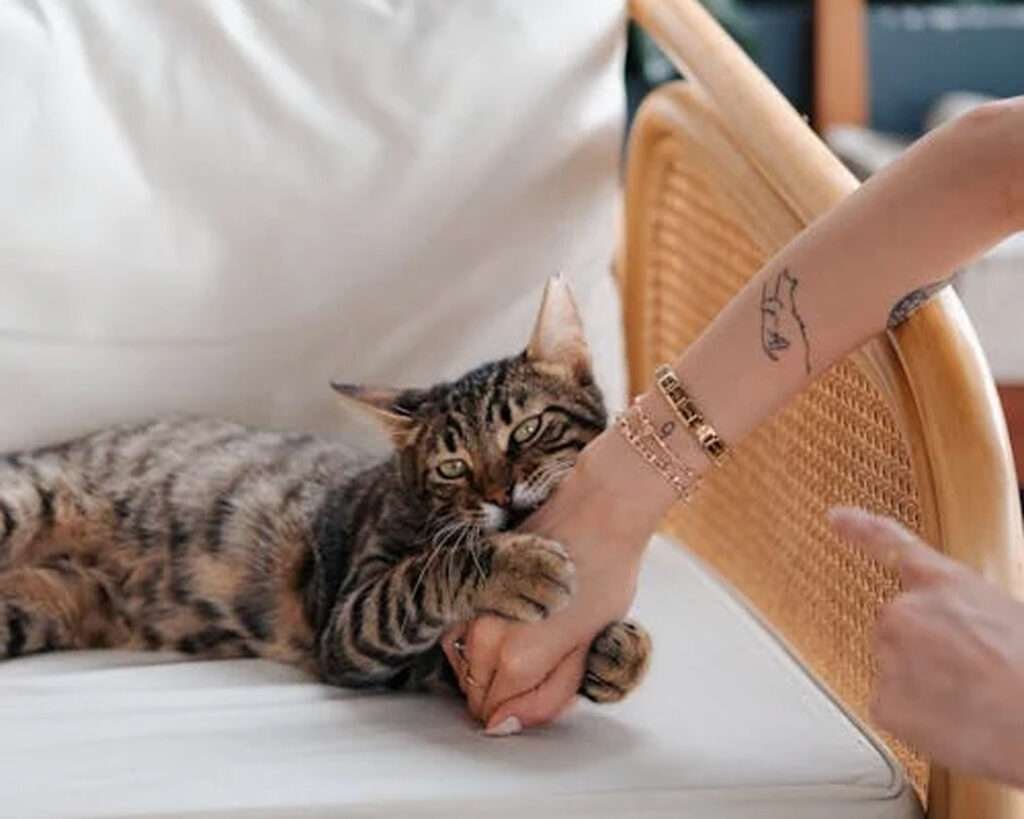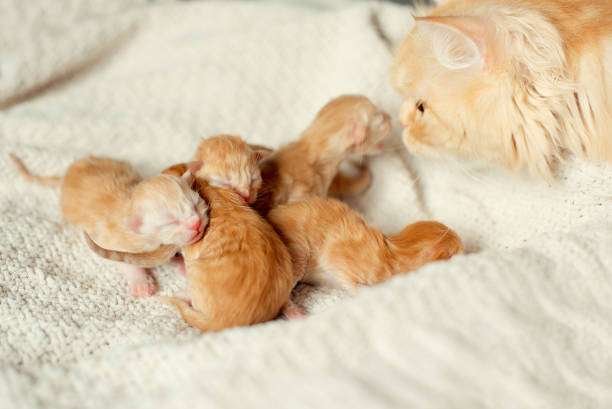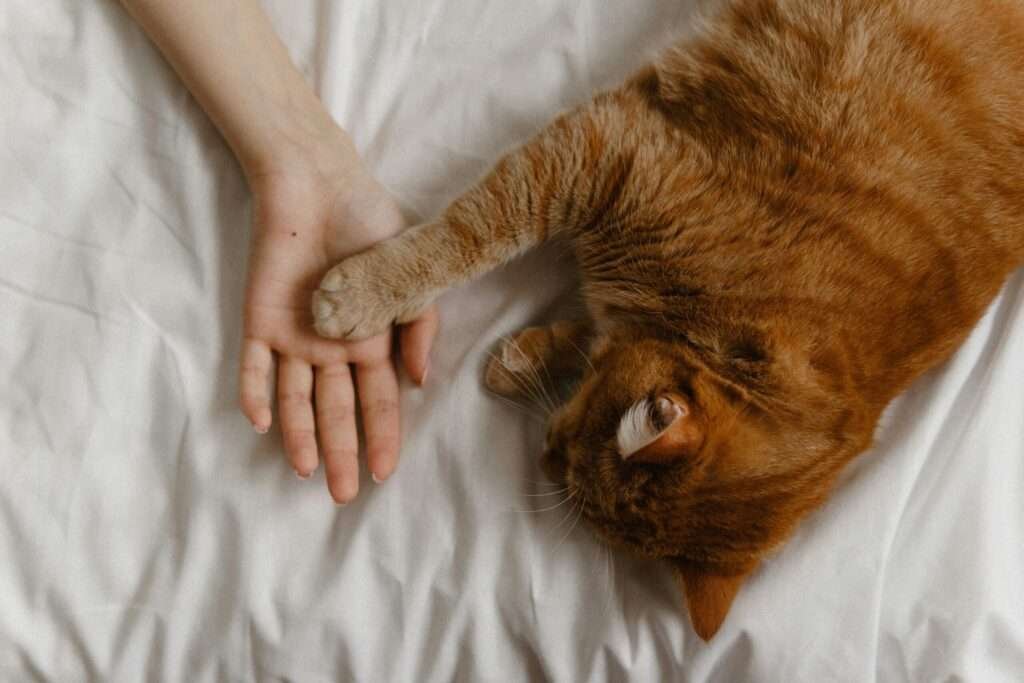If you’ve ever shared your home with a cat, you’ve probably experienced a curious behavior: one moment, your cat is peacefully licking you, and the next, it suddenly bites. This change can be confusing and a bit startling. there are many reasons behind this behavior, each rooted in your cat’s instincts and communication methods. Let’s explore why your cat licks and bites you and what it means.
Table of Contents
ToggleAffection and Bonding
When your cat licks you, that’s a sign of affection. Cats use licking as a way to bond with you, similar to how they would with other cats. This behavior is a flashback of kittenhood when a mother cat licked her kittens to clean them and show affection. When your cat licks you, it’s incorporating you into its ‘family,’ showing that it feels comfortable and safe with you.
The bite that sometimes follows licking can be puzzling. Often called a love bite, it’s usually not meant to hurt. Instead, it’s a way for your cat to signal that it has had enough of the interaction. Just as a mother cat might gently bite her kittens to keep them in place while grooming, your cat might use this technique to tell you it’s time to stop.

Overstimulation
Cats have very sensitive skin and nerves, making them prone to overstimulation. After licking you for a while, your cat might start to feel overwhelmed by the sensation. The bite that follows is an automatic response to this overstimulation—a way for your cat to say, “That’s enough!” If the bite is gentle, it’s usually not aggressive but rather a signal to stop.
Signs of overstimulation include twitching whiskers and flattened ears. If you notice these signs, it’s a good idea to give your cat a break from petting or licking. Cats that were separated from their mothers too early may have a lower tolerance for touch, making them more likely to exhibit this behavior.

Playfulness
For kittens and young cats, biting is often a part of their play behavior. Cats are natural hunters, and their play often mimics hunting practices. They use their teeth and claws to pounce on and bite toys, and sometimes, this playfulness extends to their interactions with humans.
If your cat bites during play, it might be inviting you to continue the fun. This is especially true if your cat is purring and showing other signs of enjoyment. However, it’s important to discourage this behavior to prevent future aggressive tendencies. Instead of using your hands as toys, provide interactive toys and play with your cat using these alternatives.
Sensory Exploration
Cats are curious creatures, and they use their mouths to explore their environment. If your cat is nibbling on your fingers, feet, or hair, it might be trying to learn more about you. This behavior is similar to how cats might nibble on leaves or wires. It’s their way of investigating and understanding their surroundings.
In some cases, cats are attracted to the taste or smell of human skin. Our sweat can be salty and appealing to them. However, if you use lotions, essential oils, or perfumes, make sure your cat doesn’t lick these substances, as some can be toxic to felines.
Territorial marking
Cats have scent glands on their cheeks, paws, and at the base of their tails. They use these glands to mark their territory. When your cat licks and bites you, it is claiming you as part of its territory. This behavior is a way for your cat to identify you as his own and you with his scent.
While this might sound a bit odd, it’s actually a compliment. Your cat sees you as part of its safe and secure zone. To help your cat meet its need to mark territory, provide plenty of toys and scratching posts so it can mark its belongings instead of you.
Attention-seeking
Sometimes, biting can be a way for your cat to get your attention. If you are busy and not paying attention to your cat, it may remind you that it is there and wants to interact. This behavior can be especially noticeable if your cat has been neglected or ignored.
If your cat uses biting as a way to get attention, try to make sure you give it plenty of interaction and playtime. Engaging with your cat through regular play and affection can help reduce this behavior.
Health problems
In some cases, bites can be a sign of an underlying health problem. If you have any experiences or questions about your cat’s behavior, feel free to share them in the comments. And remember, patience and understanding go a long way in building a strong relationship with your furry companion.
How to stop your kitten from biting hard
Here are seven simple tips to help you manage and reduce biting behavior:
- Use Your Voice When your kitten bites, make a short, high-pitched sound such as “Ow” or a soft hiss. This helps your kitten understand that biting is not okay. Avoid yelling or getting angry; Just use a clear, strong word.
- Redirect Their Attention If your kitten starts biting, slowly remove your hand and offer a toy instead. Use toys, such as laser pointers or chew toys, to give your kitten something else to chew on and play with. This helps them learn that toys are meant to be bitten, not your hands.
- Reward good behavior Praise your kitten and give treats when they play gently or use their toys. Positive reinforcement helps them understand what behavior is acceptable.
- Be consistent Consistency is key. Always use the same method for biting and be sure to play with your kitten using their toys. This helps them learn that biting is not acceptable and reduces the behavior over time.
- Schedule Play Time Regular play time is very important. Play with your kitten for at least 20 minutes two or three times a day. This helps them burn off excess energy and reduces biting due to boredom or overexcitement.
- Check their health If your kitten is unusually aggressive or continues to bite despite your efforts, it could be a sign of a health problem. Pain or illness can make cats more likely to bite. If you are concerned, consult a veterinarian.
Create a Safe Space: Make sure your kitten has a safe and comfortable place where all its needs are met, such as food, water, and a litter box. A safe environment helps reduce stress and anxiety, which can lead to biting.
By understanding why your cat licks and bites, you can respond appropriately and strengthen your bond. Acknowledging their needs and providing appropriate outlets for their behavior will help you enjoy a happy, playful relationship with your feline friend.
FAQ
Why does my cat lick me?
Your cat licks you as a sign of affection and to bond with you.
What is a cat love bite?
A love bite is a gentle bite from your cat to signal that it has had enough interaction.
Why does my cat bite me after licking?
Your cat bites you after licking due to overstimulation and as a way to communicate that it wants the interaction to stop.
How can I tell if my cat is overstimulated?
Signs of overstimulation in cats include twitching whiskers and flattened ears.
Is biting during play normal for kittens?
Yes, biting during play is normal for kittens as it mimics their natural hunting behavior.
Why does my cat nibble on my fingers or hair?
Your cat nibbles on you to explore and learn more about its environment.
What does it mean when my cat licks and bites me?
It means your cat is marking you as part of its territory with its scent glands.
How can I stop my cat from biting for attention?
Ensure you give your cat plenty of interaction and playtime to reduce attention-seeking biting.
Can biting be a sign of health problems in cats?
Yes, unusual biting behavior can indicate underlying health issues and should be checked by a vet.
How can I reduce my kitten’s biting behavior?
Use consistent methods like redirecting attention, rewarding good behavior, and providing interactive toys.



